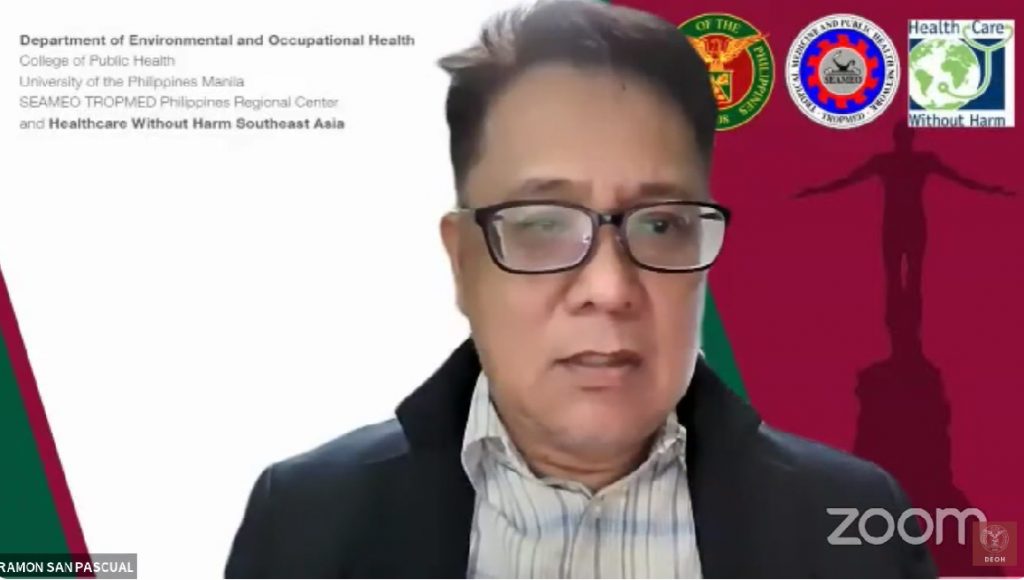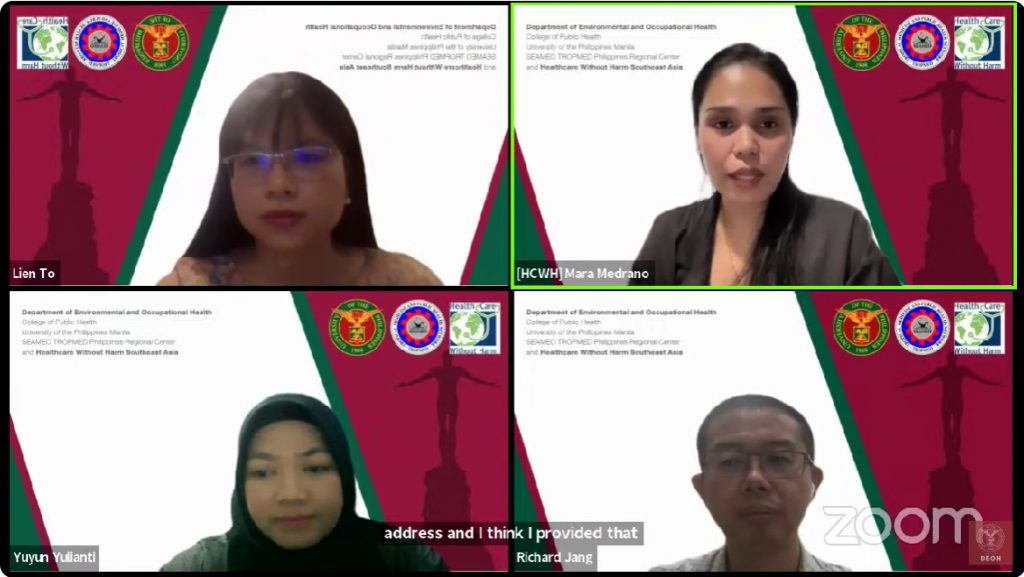The 6th Environmental and Occupational Health Forum, co-organized by UP Manila College of Public Health, SEAMEO TROPMED Philippines, the Regional Centre for Public Health, Hospital Administration, Environmental and Occupational Health, and Health Care Without Harm Southeast Asia, convened on November 23-24, 2023 via Zoom to address pressing environmental and occupational health issues specific to the region.
Themed ‘Accelerating the Development of Healthy and Climate-Smart Hospitals in the Southeast Asian Region,’ the forum kicked off with a lecture by Department of Health Assistant Secretary Beverly Lorraine Ho, who announced a draft administrative order aimed at establishing a national framework for the promotion and recognition of health facilities. This initiative will incentivize hospitals meeting standards on health systems capacity, service delivery, and employee wellness.
“Moving forward, we do hope to marry these concepts of the hospital being a workplace; the hospital as a contributor to the environment; and the hospital as a provider of services to people to different life stages is part of the work moving forward for the DOH. We will have a national framework to promote harmonize, recognition of what we would call healthy health facilities,” said ASec Ho.
In his message, Mr. Ramon San Pasqual, Executive Director of Health Care Without Harm Southeast Asia, provided an international perspective and emphasized strategic initiatives for developing climate-smart hospitals across Southeast Asia. He urged immediate action, citing upcoming international forums such as COP28, and the need to combat the adverse effects of fossil fuel use on air pollution and health.

Thereafter, Mr. Albert Dela Cruz Sr., Commissioner of the Climate Change Commission, explored the impacts and contributions of healthcare facilities to climate change adaptation and mitigation. Despite certain challenges, healthcare facilities in the Philippines are actively contributing to these efforts through infrastructure upgrades, energy-efficient practices, and waste management strategies.
Dr. Nasir Hassan from the World Health Organization (WHO) outlined the four major requirements set by WHO to provide safe and quality healthcare in the context of climate change: the ability to produce an
adequate health workforce, not only the number of skilled human resources but resilient workers that are adapted to climate change impacts; strengthening infrastructure facilities; having a good supply of green energy systems; and the development of infrastructure technologies and products.
The forum also involved counterparts from other countries who shared their best practices. Dr. Wiwat Chatwongwan, Deputy Director of Maharat Nakhon Ratchasima Hospital in Thailand, shared the hospital’s vision to transform into climate-smart, disaster-resilient, and sustainable medical centers, championing the transformative Bio-Circular-Green (BCG) economy model. Ms. Yuyun Yulianti, Team Leader of Planning and Reports at West Java Hospital in Indonesia, emphasized the utility of the climate impact
Thereafter, Mr. Albert Dela Cruz Sr., Commissioner of the Climate Change Commission, explored the impacts and contributions of healthcare facilities to climate change adaptation and mitigation. Despite certain challenges, healthcare facilities in the Philippines are actively contributing to these efforts through infrastructure upgrades, energy-efficient practices, and waste management strategies.
Dr. Nasir Hassan from the World Health Organization (WHO) outlined the four major requirements set by WHO to provide safe and quality healthcare in the context of climate change: the ability to produce an adequate health workforce, not only the number of skilled human resources but resilient workers that are adapted to climate change impacts; strengthening infrastructure facilities; having a good supply of green energy systems; and the development of infrastructure technologies and products.
The forum also involved counterparts from other countries who shared their best practices. Dr. Wiwat Chatwongwan, Deputy Director of Maharat Nakhon Ratchasima Hospital in Thailand, shared the hospital’s vision to transform into climate-smart, disaster-resilient, and sustainable medical centers, championing the transformative Bio-Circular-Green (BCG) economy model. Ms. Yuyun Yulianti, Team Leader of Planning and Reports at West Java Hospital in Indonesia, emphasized the utility of the climate impact checkup tool in addressing climate change. Mr. Richard Jang, Facilities Manager at Khoo Teck Puat Hospital in Singapore, elaborated on the hospital’s commitment to the United Nations’ “Raise to Zero” campaign. Lastly, Ms. Lien T. To, Coordinator of the Center for Health Environment Research and Development (CHERAD) in Hanoi, Vietnam, underscored the significance of a collective impact approach, involving numerous stakeholders in the pursuit of sustainable healthcare practices.

Dr. Maria Teresa Julieta U. Benedicto, Deputy Director for Administration of the Philippine General Hospital, discussed the challenges and opportunities in promoting healthy and climate-smart hospitals, using PGH’s experience as a focal point. Continuous training and regular reviews of protocols were highlighted as crucial for improvement.
Dr. Ramon Lorenzo Luis R. Guinto, who concluded the sharing sessions, delved into the future of hospitals in the context of the climate crisis and planetary health. Stressing the importance of planetary health, he outlined the contributions of the health sector to the violation of planetary boundaries and the need for hospitals to reduce their environmental footprint.

In his closing remarks, Dr. Victorio B. Molina emphasized the urgency of environmental protection and the transformative potential of the knowledge gained during the forum. The insights garnered over two days are seen as instrumental in steering healthcare institutions towards environmental health justice and healthier communities.
The forum’s outcome positions Southeast Asia as a leader in the global movement towards sustainable and climate-smart healthcare. #
Charmaine A. Lingdas